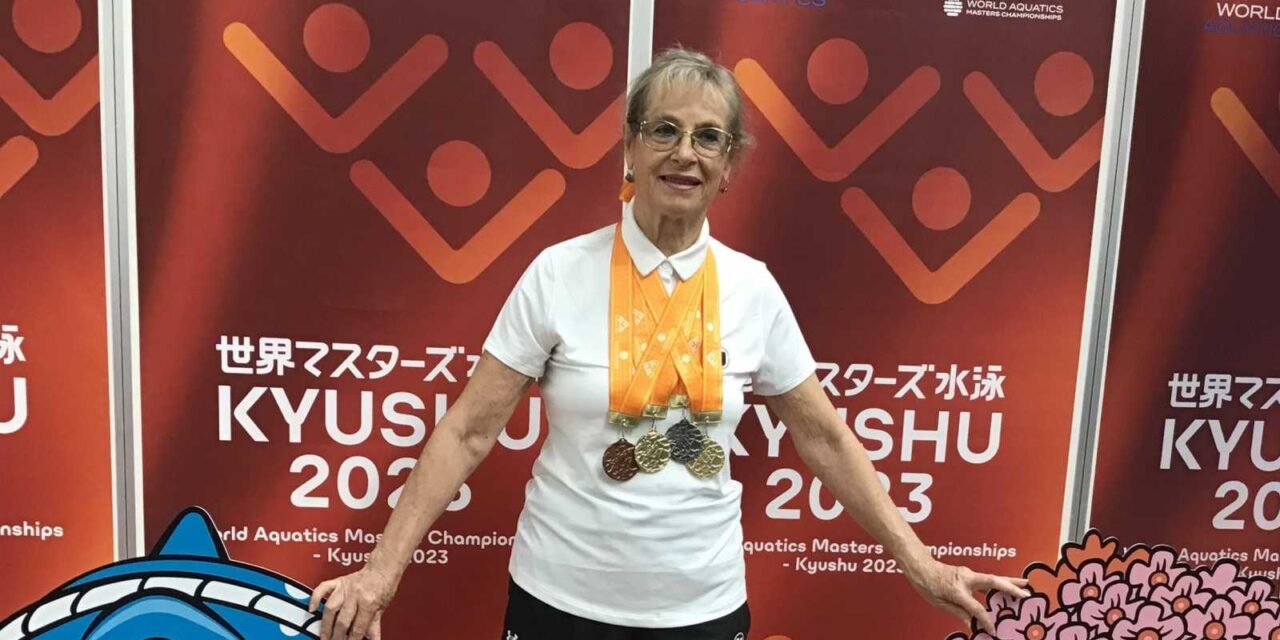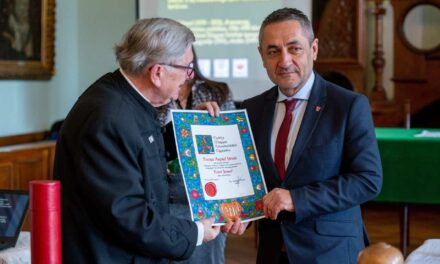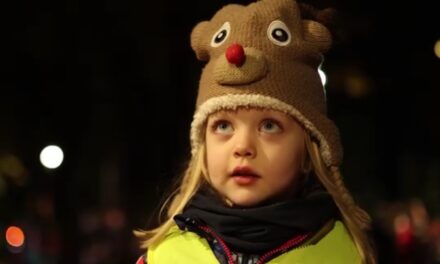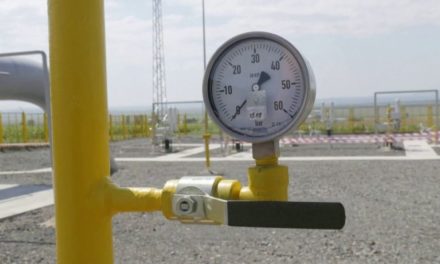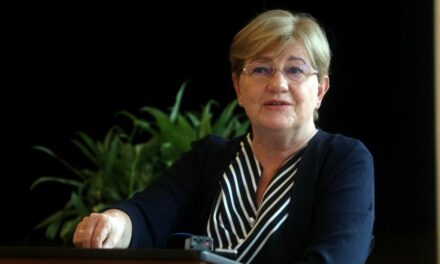Swimmer Judit Maier-Orosz from Cluj-Napoca returned home from the senior swimming world championships organized in Japan with two world championship gold, one silver and one bronze medals. The athlete who achieved excellent results measured himself in the 80-84 age group.
Judit Maier-Orosz, a native of Cluj with strong roots, welcomed us in her home. In addition to her successes, she told us about her childhood, the period before the regime change, and the more than thirty years she spent in Germany, which was very decisive in her life.
At the urging of her sister, Katalin Flóra-Orosz, she started swimming regularly in 2017, so she had the opportunity to participate in the 2019 World Championships organized in South Korea. It was a challenge for Judit Maier-Orosz to stand on the starting stone again, but she set herself the goal of winning at least one bronze medal in the 100-meter breaststroke, as she achieved the most ungrateful fourth place at the previous World Championships.
Judit Maier-Orosz is an outstanding representative of the Cluj-Napoca swimming sport, she returned home from Japan with two gold, one silver and one bronze medals from the senior world championship organized between August 5 and 11. The Russian family - as a famous Cluj swimming dynasty - can boast of five champions, among them Dr. Dr. Katalin Flóra-Orosz is a swimmer and sports doctor who won 12 championship titles and set 17 world championship records during her career.
She wouldn't trade her childhood for anything
Like smaller children in general, he was also naughty - Judit Maier-Orosz, who has been swimming since she can remember, confessed to us. His family is rooted in Cluj, and although they did not abound in wealth, they still lived in love. The family of five was supported by his father, Gábor Orosz, who was a teacher and school director, as well as an enthusiastic sportsman.
The swimmer highlighted how difficult it was to live in the city in the years before the regime change, she remembers that there was a period when there was no bread on their table:
"Since we had no relatives in the village, we only got corn in all kinds of forms".
He added that, despite this, he would not trade his childhood with his children for any amount of money, since today's young people have everything, yet many things are missing in their lives. According to the visual artist, it is very disappointing that he does not see the children talking to each other, because they are constantly staring at their phones.
Judit Maier-Orosz's parents were both swimming champions, so there was no question that she and her brother should play this sport. He said he had no problem with that, he loved to swim, even if he had to practice in ice-cold water. He pointed out that at that time in Cluj you could swim in three places: the city beach, the Clujana beach that still exists today, and the Iuliu Hațieganu sports park.
"They let tap water into the city beach, it was ice cold, only the sun warmed the water. At the sports park, water from the Szamos was released into the pool, which could also have been 16-17 degrees Celsius. The only heated, warmer pool was on the Clujana beach, but there were frogs in it, about the size of my palm, and there was a case where a frog settled on his shoulder while swimming."
he said laughing.
He also recalled the first swimming suit they made themselves, namely by sewing a male athlete between their legs, which often rubbed their skin bloody.
To illustrate how much poverty there was at that time, he told a short story about how and how his father managed to buy a Pobeda watch in Russia. In 1958, he and his sister traveled to Moscow for an international swimming competition, so his grandmother knitted him a sweater, a cardigan and a beanie hat from knotted wool threads, which he could take with him on the trip.
"Even the bird didn't fly across the border then"
he declared. In Moscow, a Russian university girl was "stuck" and begged to sell the things her grandmother had made. After a while, he gave in and sold her the things. With the money they received, they bought a radio, a rocket vacuum cleaner and a Pobeda watch for their father.
Life after university, more than thirty years in Germany
Judit Maier-Orosz was national champion six times, and also won school and university championship titles. After starting his studies in fine arts, his busy schedule left less and less time for swimming. Regardless, his university years were the most beautiful, he declared. After completing his studies, he did not find a job for a year. He also tried out at the Romanian opera, where he wanted to work as a costume designer. He approached the director and director at the time, Vlad Mugur, who liked his plans very much.
“He said it's fine, I'm going to Germany now and when I come back we'll sign the contract. But he never came home again, he stayed in Germany."
The swimmer said that at that time everyone wanted to leave the country, things had gotten so bad.
Judit Maier-Orosz moved to Germany in 1989, three months before the outbreak of the revolution. As he said, at the time he was very sorry that it turned out this way, because in the first two years he struggled with terrible homesickness.
"This resettlement is very difficult, especially when you leave a place with deep roots. I couldn't wait to close my eyes at night and dream of home."
She lived with her second husband in Munich for 4-5 years, and after her divorce, she moved to Frankfurt with her sister, where she started working as a secretary in orthopedics. According to him, it was a trying job, because that was the first time he encountered a computer, which he had to learn to operate, all in German, which was still a problem for him at the time. Despite all this, he worked there until his retirement and learned and loved the German language.
"To this day, I read in German most of the time so that I don't forget"
The brother and sister lived in Germany for more than thirty years, according to the world champion swimmer, they managed to fit in among the Germans, but because of their dwindling circle of friends, they decided to move back to the treasured city.
"The only advantage of our stay in Germany is that we have traveled the whole world"
Judit Maier-Orosz said that the only advantage of their stay abroad was that they could travel around the world.
"We've been everywhere from Hawaii to Indonesia to Sri Lanka to Australia"
- He told. When asked, he told us that his favorite place is the Windward Islands in the middle of the Pacific Ocean.
"We always looked for a destination that had water and culture nearby to expand our horizons"
he explained. He always prepared carefully for these trips and prepared descriptions, because he does not like to see the world in a way that is not documented beforehand. In connection with this, he showed us the documentation he prepared for his trip to Japan, where this year the World Senior Swimming Championships were organized.
The swimmer said that all over the world she understood the locals and the people also understood her, but that was not the case in Japan, where she encountered communication barriers quite a few times. Despite the fact that Japan was not his favorite country, he still finds it interesting how many trials the country's population has gone through throughout history, but despite all this, it is still at the forefront of the world economy. They are extremely "hard-working and hard-working", it was said several times during our conversation, according to the swimmer, the only way the Japanese could make it so big was that they worked without a break.
During his two-week stay in Japan, he and his traveling companions visited many historically and culturally important locations in the country. They reached Kyoto, known as the imperial city, faced typhoons in the cities of Nara and Osaka, and in Tokyo the hustle and bustle of the city of 35 million people and the agglomeration posed a challenge. Judit Maier-Orosz also contracted the coronavirus in Japan, the effects of which she is still feeling.
Among his future plans is to set up an exhibition space in the attic of his family house, which pays tribute to the work of his grandfather, archaeologist and local historian Endre Orosz.
Featured image: Judit Maier-Orosz's personal archive

